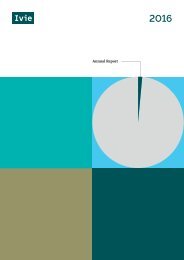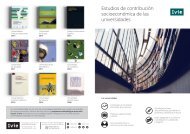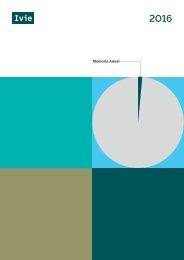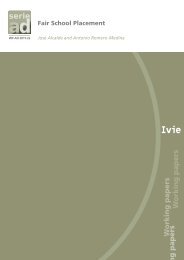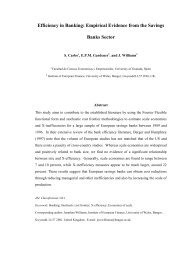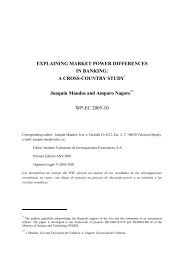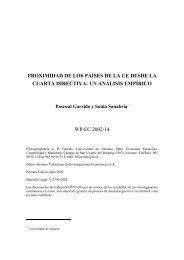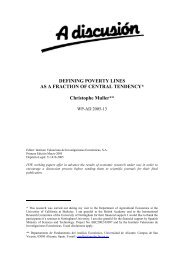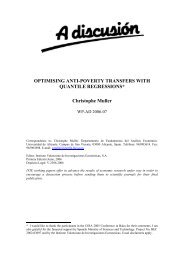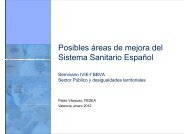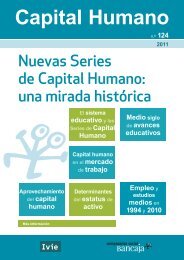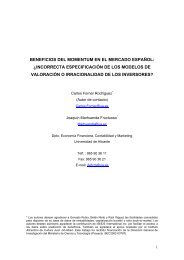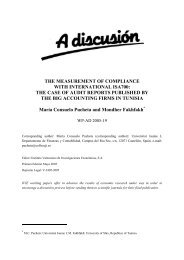Create successful ePaper yourself
Turn your PDF publications into a flip-book with our unique Google optimized e-Paper software.
Isidro Cantarino (Universitat Politècnica de Valencia)<br />
Pilar Chorén (<strong>Ivie</strong>, Universitat de València)<br />
EDUCATION AND DEVELOPMENT. PISA 2009 AND THE SPANISH EDUCATIONAL SYSTEM (2011-2012)<br />
Since the year 2000, the Organization for Economic Cooperation and Development (OECD) has launched an<br />
international standardized evaluation program of the knowledge gained by 15-year-old students, an age that<br />
coincides with the end of compulsory education. Every three years, the Programme for International Student<br />
Assessment, known as PISA, tests the skills and knowledge of these young people in reading, mathematics and<br />
science. In addition to these skill tests, the PISA <strong>report</strong>s provide a huge amount of information on the students’<br />
lives, on their family background and on the school they attended. This data helps examine the relationship<br />
between tests’ scores and environmental conditions, assessing the equity of the educational systems and<br />
identifying the conditions that lead to better results.<br />
However, there are three basics aspects of the functioning of the different educational systems that have not<br />
been thoroughly examined neither by the studies accompanying the PISA <strong>report</strong>, nor by the associated<br />
literature, and which require special attention in the Spanish case. This research project, carried out for the<br />
BBVA Foundation, focuses on the analysis of these aspects: 1) it studies in depth the measurement of<br />
educational scores and not only the average scores of the PISA tests; 2) it examines the relationship between<br />
educational attainment, economic growth and the labor market; and 3) analyzes the causes and nature of the<br />
large differences in school performance between the Spanish regions.<br />
Research team:<br />
Antonio Villar (dir.) (<strong>Ivie</strong>, Universidad Pablo de Olavide)<br />
Sara de la Rica (Universidad del País Vasco, FEDEA)<br />
José Ignacio García Pérez (Universidad Pablo de Olavide)<br />
Ainara González (Universidad del País Vasco)<br />
Marisa Hidalgo (Universidad Pablo de Olavide)<br />
José Antonio Robles (Universidad Pablo de Olavide)<br />
Lorenzo Serrano (<strong>Ivie</strong>, Universitat de València)<br />
Ángel Soler (<strong>Ivie</strong>, Universitat de València)<br />
Héctor García (<strong>Ivie</strong>)<br />
VERTICAL DIFFERENTIATION AND SOPHISTICATION OF EXPORTS IN INTERNATIONAL TRADE (2011-<br />
2012)<br />
The objective of this study for the BBVA Foundation is to continue the line of research on trade and<br />
international specialization started in 2010. On this occassion the patterns of specialization of countries are<br />
studied according to their vertical dimension (the specialization throughout the different ranges of price and<br />
quality within each type of goods), combining it with an analysis of the horizontal dimension (the specialization<br />
along different types of goods). Next to the more descriptive analysis, an assessment of the international<br />
specialization of countries is carried out, from the point of view of their ability to maintain high levels of per<br />
capita income, according to their exports sophistication. Data covers more than 5,000 products and 150<br />
economies. Also a diagnosis is made of the strengths and weaknesses of the Spanish foreign sector, as well as<br />
the challenges and opportunities it is facing.<br />
Research team:<br />
Francisco Alcalá (dir.) (<strong>Ivie</strong>, Universidad de Murcia)<br />
Pilar Chorén (<strong>Ivie</strong>, Universitat de València)<br />
Marta Solaz (Universitat de València)<br />
Research and economic studies 43



